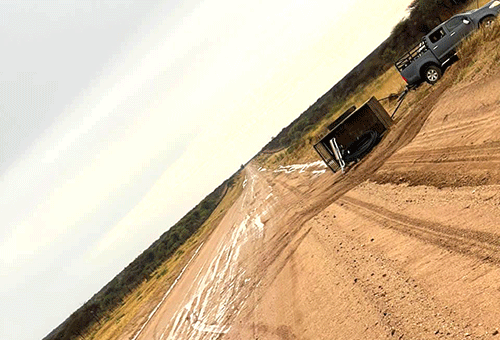The domestic road sector continues to grapple with a significant funding crisis, which authorities have cautioned is insufficient to cover the costs of maintaining the nation’s road network.
The lack of capital has been highlighted by an average deficit of 25.7% in Road User Charges (RUC) revenue from 2016 to 2024.
Moreover, RUC projections indicate this deficit will worsen, with estimates anticipating a staggering 68.7% average deficit from 2027 to 2029, and a peak shortfall of N$3.8 billion in 2025.
These figures were shared yesterday by Matthew Townsend, an expert in transport economics, affiliated with BetaEconomics, a company situated in Strasbourg, France. He was presenting during the second day of the Road Sector Policy Conference, which is underway in the capital.
The event is themed ‘Strengthening Institutional Capacity for a Sustainable Road Sector’.
Cumulatively, he predicts, the sector faces a daunting deficit of N$21.6 billion over the period from 2024 to 2029.
“The automatic balancing of revenue with funding needs appears virtually impossible, prompting calls for substantial reforms in the RUC system,” the economist advised.
He pointed out that the core issue stems from the fuel levy, which has not kept pace with inflation, leading to diminished revenue for road maintenance and exacerbating the backlog in infrastructure upkeep.
As the number of efficient and electric vehicles increases, contributions from the fuel levy are expected to decline further.
This trend necessitates a strategic recalibration of the fuel levy to align it with inflationary pressures, and rising road maintenance costs.
He suggested several key strategies to address these challenges, including recalibration of fuel levy.
This entails gradually adjusting the fuel levy to reflect inflation and actual road costs, which is crucial for stabilising revenue streams.
On government support, Townsend proposed direct transfers from government to bridge the funding gap for road maintenance.
This approach could ensure that critical infrastructure projects are not sidelined due to budget constraints.
“However, these avenues should not negatively affect government’s declining debt trajectory,” he cautioned.
Opening the conference on Monday, Roads Authority CEO Conrad Lutombi said the Namibian road sector stands at a critical juncture, as it faces an urgent need for adequate funding to maintain and expand its national road network.
As the country grapples with population growth, urbanisation and increased economic activity, the pressure on road infrastructure has intensified.
This highlights the necessity for sustainable investment.
In recent years, Namibia’s total national road network has expanded significantly from some 41 800 kilometres (km) immediately after independence to close to 50 000km in 2024.
Lutombi added that the approved budget for road maintenance has been declining, leading to a severe shortfall of N$2.8 billion in funding for essential maintenance activities.
“This underfunding has resulted in a decline in road conditions across the country, with many roads falling into disrepair,” he stated.
Considering the critical nature of the funding dilemma, stakeholders within the transport sector are calling upon the government and relevant authorities to prioritise investment in road infrastructure.
The consequences of neglecting this critical area could lead to catastrophic outcomes for Namibia’s economy and social services.
Finance minister Iipumbu Shiimi told the audience to deliberate and create solutions before turning to government.
Late last year, Road Fund Administration (RFA) executives warned about the underfunding.
This is as the RFA was expected to experience an N$3.6 billion funding gap during the last financial year, and a N$15 billion funding gap over the five-year business plan, running from April 2024 to March 2029.
The RFA was established to manage the road fund and the road user charging system to secure and allocate sufficient funding to realise a safe and efficient road sector in the country.
To tackle the shortfall, the RFA has proposed RUC adjustments, and toll roads at strategic locations.
“The RUCs tariff adjustments remain important and necessary in order for the RFA to close the funding gap, to optimally fund the road network, and to further address the rapidly-deteriorating conditions of both national and event roads,” said RFA CEO Ali Ipinge at the time.
In recent years, he has also proposed an increase in the fuel levy.


